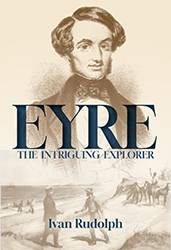Charles and Alfred Langhorne
Charles and Alfred Langhorne were successful overlanders of cattle to Adelaide. Langhorne’s Ferry crossing at the Rufus was named after Charles, while the town of Langhorne Creek in South Australia is named after Alfred. He had established a run nearby with cattle brought during the first overlanding along the Portland Road in 1839, led by Charles Bonney.
Both Langhorne brothers became unpopular through showing little gratitude to the police and volunteers for rescuing their cattle that had been dispersed during an ambush at the Rufus. Having been in the field longer than anticipated in order to round up stock, the party’s rations ran short, but it was only with extreme reluctance that Alfred Langhorne allowed one bull to be slaughtered for food, and then flatly refused to provide any further fresh meat for the men. Inspector Alexander Tolmer records an interesting altercation that occurred next between Alfred Langhorne and O’Halloran as they socialised around the Major’s campfire:
The Major turned to Mr Langhorne and said, “Oh, Mr Langhorne, will you let one of your men kill a beast, as we are in want?”
To which he replied, “I couldn’t think of such a thing as I am under a bond to deliver so many head in Adelaide.”
All eyes were fixed on the Major at this unexpected and audacious reply, wondering how he would take it. Turning around again with a face stamped with utter astonishment, he rejoined, “Well, then, will you sell us one?”
He, however, refused for the same reason.
Without another word, the Major said, “Sergeant, go and kill the fattest beast in the herd, and when that’s done, shoot another until I countermand the order.” And then added, “Mr Langhorne, we’ll dispense with your further company,” and waved him away with his hand. In this way, the problem of short rations was solved.
As soon as their cattle were sold in Adelaide in 1841, Charles and Alfred scuttled back to Victoria.
Charles worked on properties and was a drifter before dying, unmarried, at the relatively young age of 42 years.
The wily Alfred, nicknamed “Liar Langhorne” because he was exposed for making false claims, did well financially because of his partnership with his uncle Captain William Lonsdale, the government’s representative.



